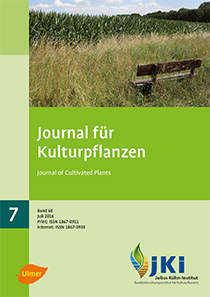Status Quo of use of copper pesticides in German agriculture and horticulture
Keywords:
Copper, application rate, sales volumesAbstract
The authorization for using copper pesticides against bacteria and fungi in European agriculture was extended to expire on 31 January 2018, following the receipt of an application for renewal of approval. The EU issued the authorization under the condition to provide efforts to reduce the use of copper pesticides to the minimum required to achieve the desired effects. Since 2011, the Federal Research Centre for Cultivated Plants (Julius Kühn-Institut) and the Bund Ökologische Lebensmittelwirtschaft e.V. (BÖLW) are documenting continuously the efforts of minimizing copper and the search for alternative solutions.
Important progress was made in recent years to continually reduce copper application rates. The applied amounts of copper per hectare in conventional crop protection in grape, hop and potatoes are well below the amounts of copper used in organic farming whether they are nearly the same in apple growing. Due to the different farming area, only 24% (26.5 t) of the total amount of copper was applied in organic farming; 76% (84.8 t) was applied in conventional farming. While in integrated pest management, copper preparations are very important in terms of a necessary change of effective substances and a successful resistance management, the availability of such preparations is often essential e.g. for organic wine, hops and fruit production and for the expansion of organic farming of these crops. A complete renunciation of copper as a pesticide is not yet practicable in organic farming, because that would make the production of several crops unprofitable and would lead to reconversion to conventional production.
DOI: 10.5073/JfK.2016.07.01, https://doi.org/10.5073/JfK.2016.07.01
Downloads
Published
Issue
Section
License
The content of the journal is licensed under the Creative Commons Attribution 4.0 License. Any user is free to share and adapt (remix, transform, build upon) the content as long as the original publication is attributed (authors, title, year, journal, issue, pages).
The copyright of the published work remains with the authors. The authors grant the Journal of Cultivated Plants, the Julius Kühn-Institut and the OpenAgrar repository the non-exclusive right to distribute and exploit the work.







